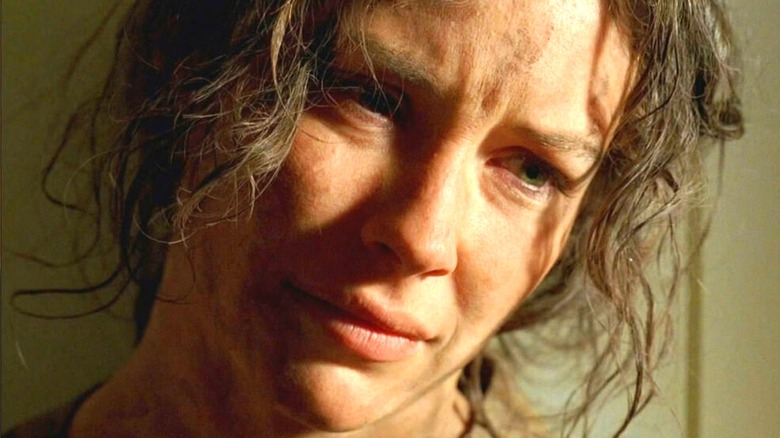
What is the legacy of "Lost"? In 2022, that question is difficult to answer. When it aired, "Lost" was largely responsible for establishing the modern "event television" phenomenon that we see so often today, as fans ecstatically tuned in each week to see where the epic science fiction adventure series would go next. However, the ending has continued to spark controversy among fans and critics alike. In the wake of the divisive series finale of "Game of Thrones," it was hard not to be reminded of the similar discourse surrounding the final episode of "Lost," "The End."
"Lost" also helped launch the career of some of the most influential storytellers working in the industry today. Long before he used his skills to revitalize both the Star Trek and Star Wars franchises, J.J. Abrams helped co-create "Lost." The series' pilot in particular benefits from Abrams' cinematic direction. The show's other co-creator, Damon Lindelof, has gone on to create a number of challenging science fiction shows; he helmed both the acclaimed sci-fi mystery drama "The Leftovers" and the subversive superhero miniseries "Watchmen."
"Lost" follows the survivors of a plane crash, who are stranded on a mysterious island in the middle of the South Pacific Ocean. Over time, this group of strangers realize that they are all more closely connected than they initially realized, and the series' six-season run introduces many other mysteries, not all of which are thoroughly explained. Still, for many fans, the ride is more important than the destination, so here are the 21 best "Lost" episodes, ranked from worst to best.
Deus Ex Machina (Season 1, Episode 19)
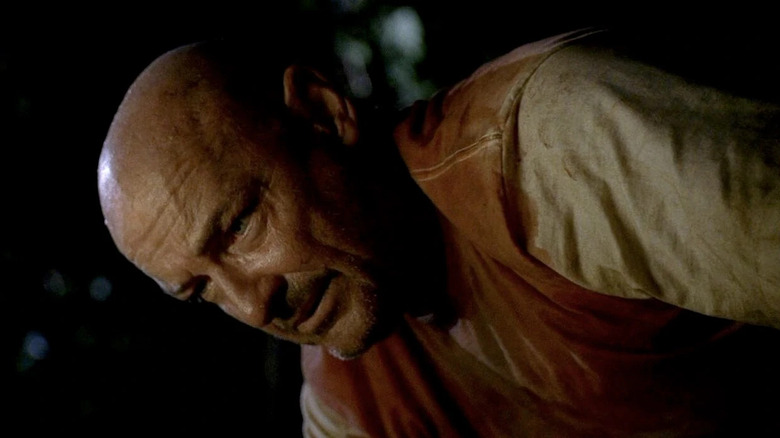
After the emotional revelations about Locke's condition in "Walkabout," the first season continued developing the tragic origin story of one of the show's most complicated characters with "Deus Ex Machina." Before he's confined to a wheelchair, Locke has a brief encounter with his birth mother, Emily (Swoosie Kurtz), who tells her son that he has no father. As a result, a curious Locke hires a private investigator, which leads him to the discovery that his father, Anthony, owns an elaborate mansion.
Initially, Anthony appears to deeply care for his son's well-being, and they form a strong emotional bond. However, Anthony's intentions are much more sinister than they appear: He needs one of Locke's kidneys for an upcoming surgery. Locke can't see through his father's deceit, and lovingly offers to donate his organ for the transplant.
After the surgery is completed, Locke wakes up and realizes that his father has completely abandoned him. Locke has to confront the fact that his father only pretended to care about him in order to receive the transplant; Locke, at his most vulnerable, breaks down in tears. It is one of the show's most heart-wrenching moments, and explains why Locke is so hesitant to take other characters at their word.
Tricia Tanaka Is Dead (Season 3, Episode 10)
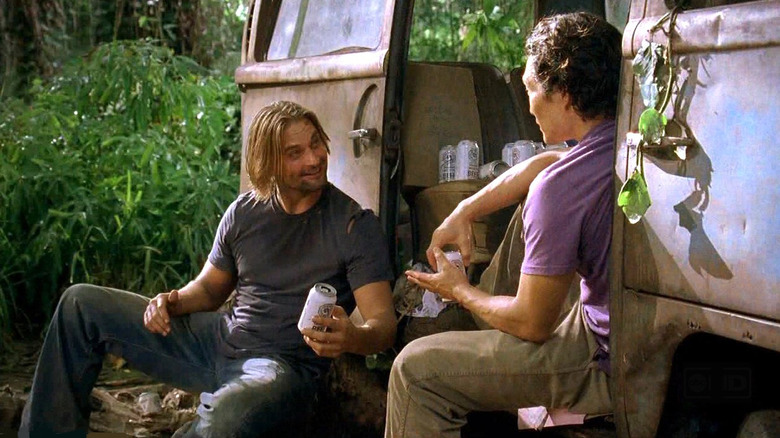
"Lost" is a fairly serious show, but that doesn't mean that it's short on humor. The comedic banter between the characters is part of the reason why the show felt so relatable, despite the fantastical circumstances. "Tricia Tanaka Is Dead" is one of the most purely entertaining episodes of the series, showing the characters of "Lost" doing what they do best: Working together to find a creative way to solve a problem.
Hurley, Sawyer, and Jin have to team up to get a beaten-down DHARMA van running again. At the time, the episode was a nice change of pace from the exposition-heavy installments that had dominated season 3 thus far. It was simply entertaining to see these characters spending time together, as this particular combination hadn't interacted much previously. The episode concludes with a heartfelt series of romantic scenes: Jin brings Sun a flower, Charlie comforts Claire, and Sawyer longs for Kate.
Ab Aeterno (Season 6, Episode 9)
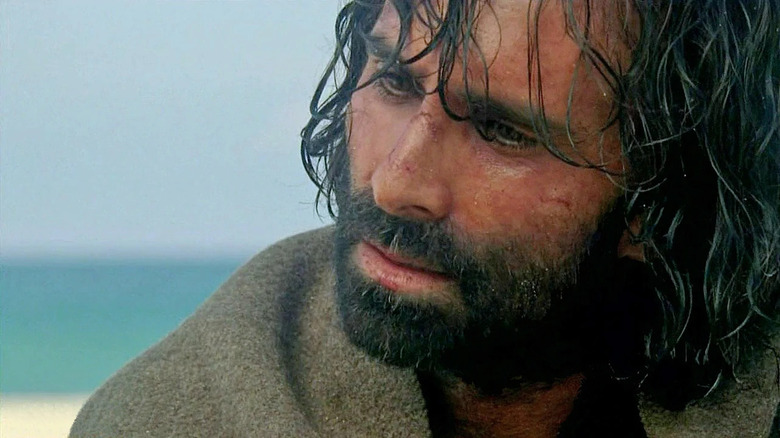
The last season of "Lost" is easily the most mythologically rich of the series, but viewers were divided over the show's deeper exploration of the metaphorical battle between good and evil that dominated the final stretch of episodes. Was this really what the show was leading to? However, despite the disappointment expressed by some fans, "Lost" never forgot the reason why it was so successful in the first place: empathy for its characters.
The backstory of Richard Alpert (Nestor Carbonell), one of the mysterious leaders of the Others, is told in an emotional love story that rivals Desmond and Penny's in "The Constant." Once known as Ricardo, Richard was first brought to the island as a slave on a ship called the Black Rock in 1867. Richard had been imprisoned for inadvertently killing a doctor when he was trying to save his wife, Isabella (Mirelly Taylor), who succumbs to illness and dies. When the Black Rock crashes on the island, Richard is freed from the wreckage by the Man in Black. "Ab Aeterno" gives fans what they wanted most — some answers — but does so in the most "Lost" of ways: by focusing on the characters' humanity, not the island's bigger mysteries.
Flashes Before Your Eyes (Season 3, Episode 8)
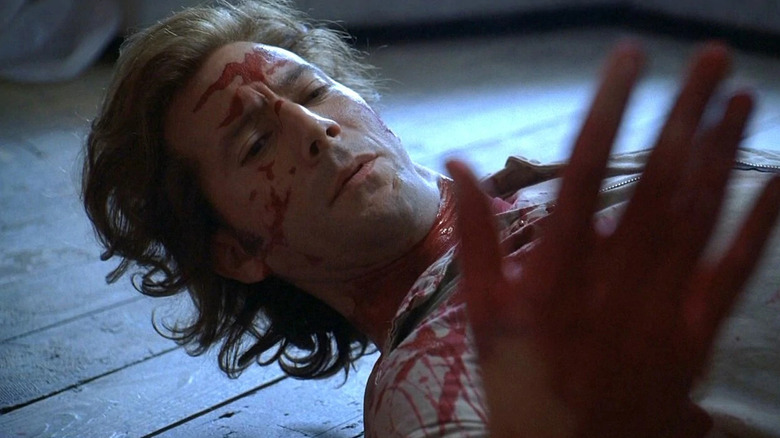
Foreshadowing is a big part of the success of Lost; as much as it felt like the show was making up its mythology as it went along, certain episodes indicated that some revelations were planned years in advance. "Flashes Before Your Eyes" helped to tease two of the show's most important future events by developing Desmond's life before he came to the island and revealing that Charlie was destined to die saving Claire.
Desmond's backstory would be more thoroughly examined in "The Constant," but "Flashes Before Your Eyes" does a good job at fleshing out his relationship with Penny. The emotional impact of "The Constant," which appears later in this ranking, would not have been as effective if "Flashes Before Your Eyes" hadn't established their relationship in such a compelling way. When Desmond tells Charlie that he will die after saving Claire Littleton (Emilie de Ravin) from drowning, it allows the former singer to begin maturing. This is vitally important, as the culmination of Charlie's arc is one of the show's most powerful farewells.
The Brig (Season 3, Episode 19)
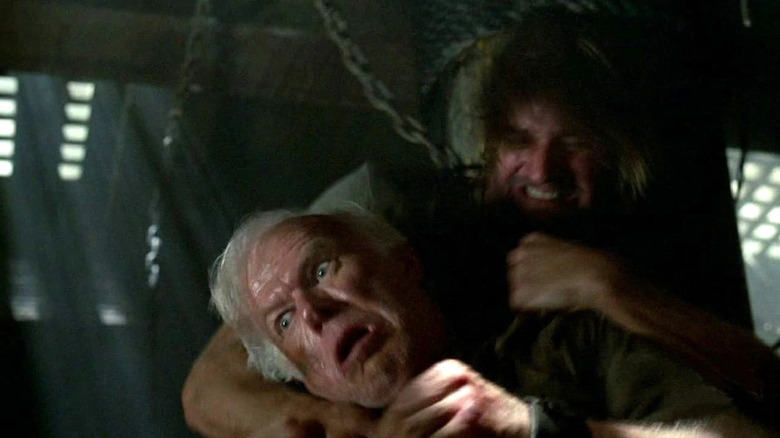
"The Brig" features one the most satisfying character deaths on "Lost." Locke's father, Anthony Cooper (played by a scenery-chewing Kevin Tighe in a wonderfully deranged performance), is one of the most unlikable characters in the series — most of the villains on "Lost" are at least somewhat empathetic, but Cooper is pure evil. In addition to abusing and insulting his son, Cooper was also responsible for the death of Sawyer's parents.
Cooper mysteriously appears on the island after being brought there by the Others. He assumes that he is in some sort of afterlife, and that he is simply seeing memories of his son. Sawyer and Locke are two of the most emotionally closed-off characters on the series, but they are able to open up to each other about their mutual hatred for Cooper. After Cooper tries to pin Sawyer's tragic upbringing on his father, Sawyer murders him. Seeing such a detestable character perish is reason enough for "The Brig" to be included on any list of the best "Lost" episodes.
The Variable (Season 5, Episode 14)
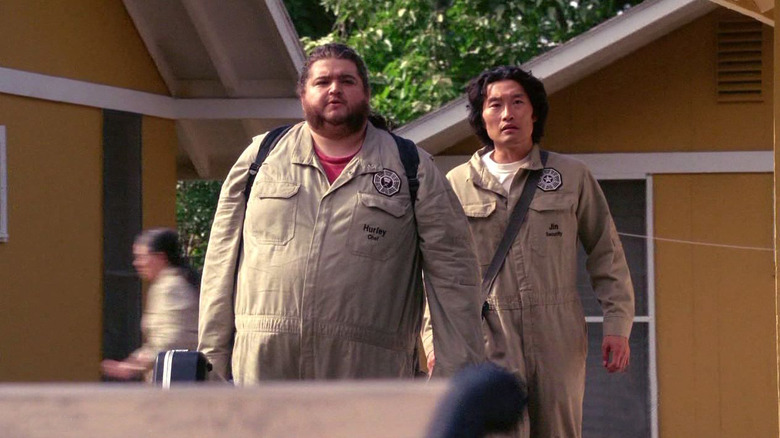
The 100th episode of "Lost" featured one of the show's coolest plot twists. "Lost" had fully embraced time travel in its fifth season, and used a time loop to help flesh out the backstory of Daniel Faraday (Jeremy Davies). Daniel, one of the most likable characters in the series, first appeared in the season 4 premiere, "The Beginning of the End," and hisnowledge of time travel helped to explain the potentially confusing parallel timelines. As a result, it only made sense to use time travel to reveal his origin story.
Daniel is told at a young age that he is destined for brilliance by his mother, Eloise Hawking (Fionnula Flanagan). When he grows up, Daniel studies at Oxford University, and receives an enormous research grant from Charles Widmore (Alan Dale), but does not know that Charles is actually his father. Dale's appearance helped tie "The Variable" to the show's previous time travel episode, "The Constant," and helped explain the motivations of one of its best characters, more than earning its place here.
Walkabout (Season 1, Episode 4)
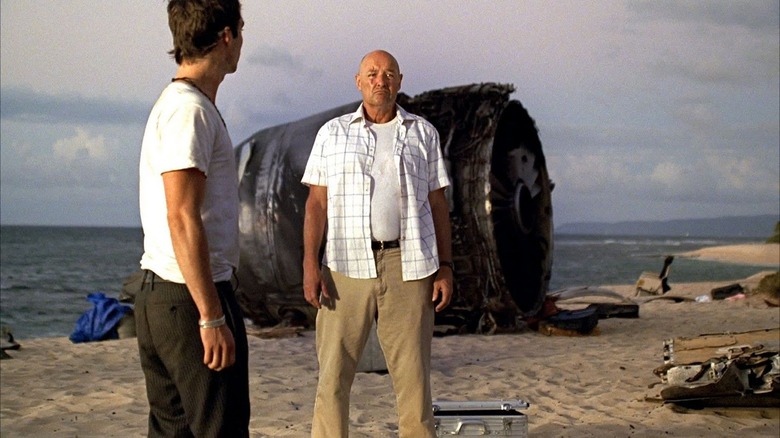
"Walkabout" is one of the most important episodes of "Lost," and features one of the most powerful flashbacks in the entire series. The first season of "Lost" remains its best because of its brilliant structure, with each individual episode dedicated to one of the characters' lives before the plane crash. Locke's first spotlight reveals that, prior to the accident, he was paralyzed from the waist down, and that the island somehow healed him.
Not every twist in "Lost" was about the island itself. The revelation about Locke's medical condition was a powerful emotional moment, and shed quite a bit of light on his motivations and where his character arc would go in the future. Locke is naturally keen to take advantage of his newfound strength, and to prove himself as both a hero and leader. Even when Locke makes questionable decisions later on in the series, "Lost" fans remember the challenging position that he was in originally, giving him a certain degree of inevitable sympathy.
I Do (Season 3, Episode 6)
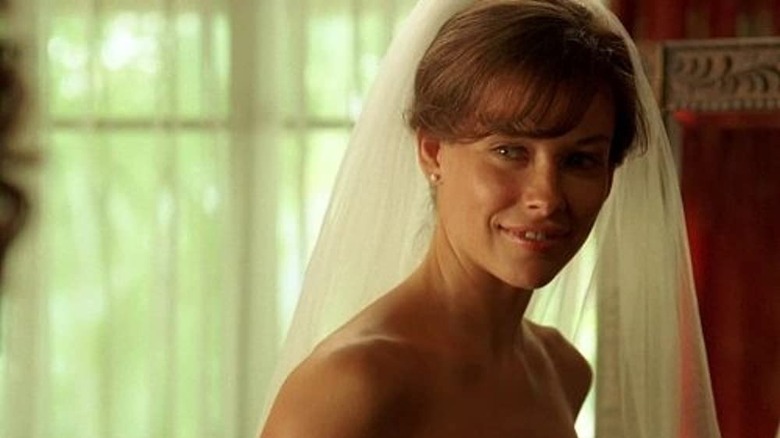
"I Do" was the last episode aired before "Lost" season 3 took its mid-season break, and it left fans with a jaw-dropping cliffhanger as Jack attempts to escape from Hydra Island by putting Ben in a compromising situation. Ben is suffering from a tumor, and Jack agrees to perform the life-saving surgery he needs, but cuts one of Ben's critical organs while he is on the operating table. Jack then offers the Others a choice: If they don't let him talk to Kate and save Sawyer, Ben will die.
This was a more ruthless side to Jack then we had seen before, but it emerges because he's suffering from a broken heart. During his escape, Jack catches Kate sharing a romantic moment with Sawyer. "I Do" allows the viewer to empathize with both Jack and Kate, with flashbacks that reveal Kate's tragic backstory and her failed marriage to police officer Kevin Callis (Nathan Fillion).
Orientation (Season 2, Episode 3)
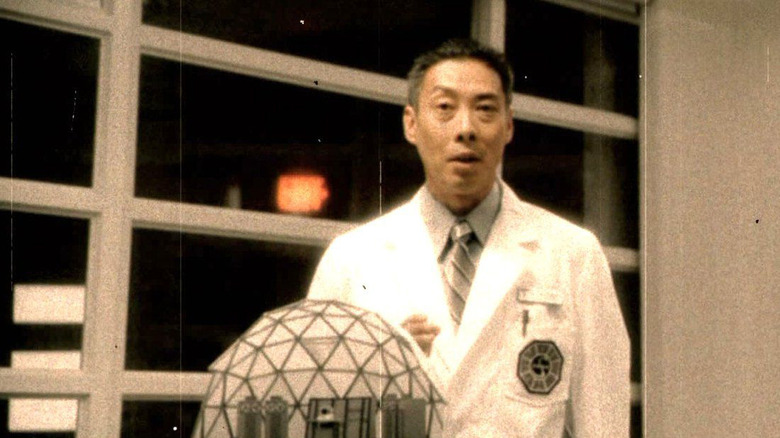
"Orientation" is packed with cool revelations about the DHARMA Initiative that help flesh out the "Lost" mythology, particularly the creepy orientation video that Desmond shows to Jack and Locke. A video from 1980 that's narrated by Dr. Marvin Candle (François Chau) explains that the hatch is one of six research facilities built to protect the island from what Desmond calls "the end of the world." Desmond is convinced that if he does not enter a specific computer code into a terminal every 108 minutes, there will be a devastating "incident."
"Lost" does a great job at forcing the viewers to pick sides during heated confrontations. Jack believes that the video is part of a sustained behavioral experiment, but Desmond finds no reason to doubt that the recording is sincere. Locke errs on the side of caution, and agrees with Desmond. This prompted an interesting debate among "Lost" fans: Would you be willing to risk your safety to prove that you were right?
The Shape Of Things To Come (Season 4, Episode 9)
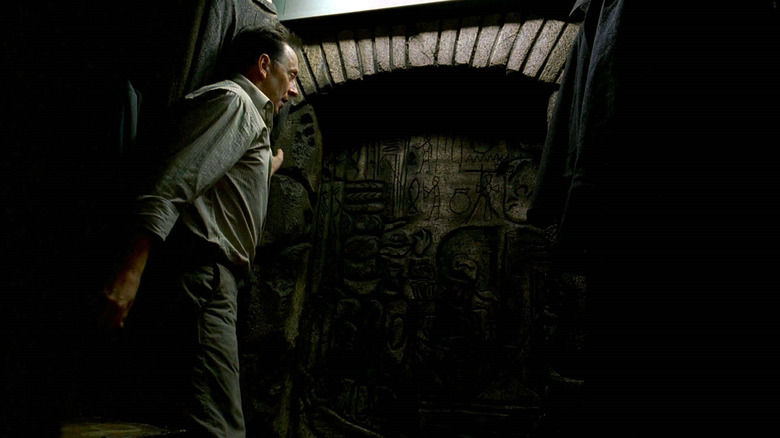
"Lost" had its fair share of jaw-dropping moments, but few deaths in the series were as emotional as the murder of Ben's daughter, Alex (Tania Raymonde). Martin Keamy (Kevin Durand) attacks Ben's community and manages to capture Alex, who sets off a warning that informs her father just in time to prepare a defense. Ben, Locke, Hurley, and Sawyer prepare for the attack, but the mercenaries are ruthless.
Emerson had been one of the best actors on the series since making his debut in season 2, but "The Shape of Things to Come" contained some of his finest work to date. Ben assumes that Keamy's threats to execute Alex are a bluff; he is shocked when the mercenary actually kills his daughter in cold blood. Emerson's gut-wrenching reaction to the violent event helped earn him anEmmy nomination for best supporting actor.
A Tale Of Two Cities (Season 3, Episode 1)
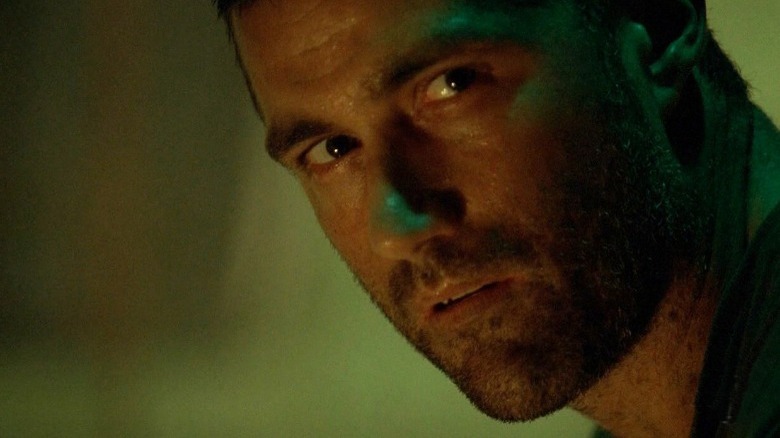
Season 3 of "Lost" opened with an interesting twist on events that viewers were already familiar with as the crash of Oceanic Flight 815 is shown from the perspective of the Others. After seeing the plane begin to deteriorate mid-flight, Ben orders Goodwin Stanhope (Brett Cullen) and Ethan Rom (William Mapother) to go undercover as members of the survivors.
Jack is at his most vulnerable in "A Tale of Two Cities." In flashbacks, Jack begins to suspect that his father has been sleeping with his wife, Sarah (Julie Bowen). Jack follows Christian to an AA meeting and attacks him. In the present timeline, Jack reflects on his failed marriage, while Juliet Burke (Elizabeth Mitchell) reveals documents that recount Jack's entire life; when Juliet asks Jack if he has any questions about Sarah, he simply asks if she is happy.
Live Together, Die Alone (Season 2, Episodes 23 And 24)
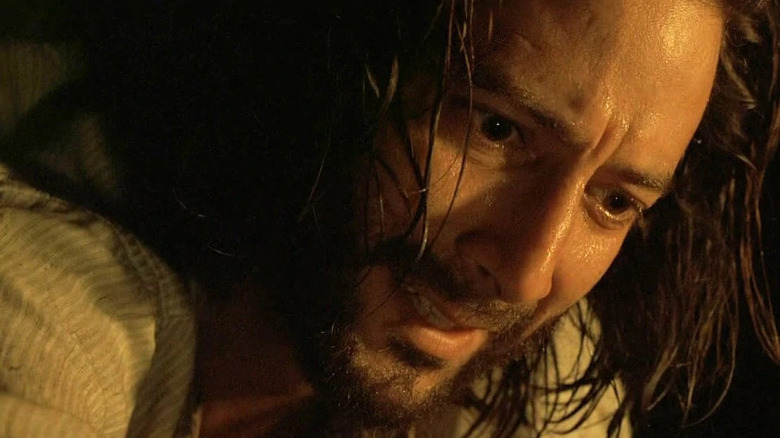
Season 2 of "Lost" belonged to Michael Ian Cusick. While establishing the mythology of the bunker and the DHARMA Initiative was important to set up future seasons, the never-ending series of revelations left viewers with more questions than answers. Although the narrative became more than a little confusing, Cusick's performance as Desmond brought the emotional weight to the season. This was exemplified in the two-part season 2 finale, "Live Together, Die Alone."
In a flashback that takes place in 2001, Desmond is set free from military imprisonment under mysterious circumstances. Although he is desperate to reunite with Penny, her father, Charles Widmore (Alan Dale), warns Desmond to cease his pursuits. However, Desmond refuses to back down; in order to prove himself, he begins training for a yacht race. During the competition, a devastating storm hits, and Desmond washes up on the island.
In addition to the flashbacks to Desmond's life, "Live Together, Die Alone" teased the greater importance of the numbers 4, 8, 15, 16, 23 and 42. It also ends on a great cliffhanger: In the epilogue, a polar research team contacts Penny, and tells her that they've found a major clue.
The Man Behind The Curtain (Season 3, Episode 20)
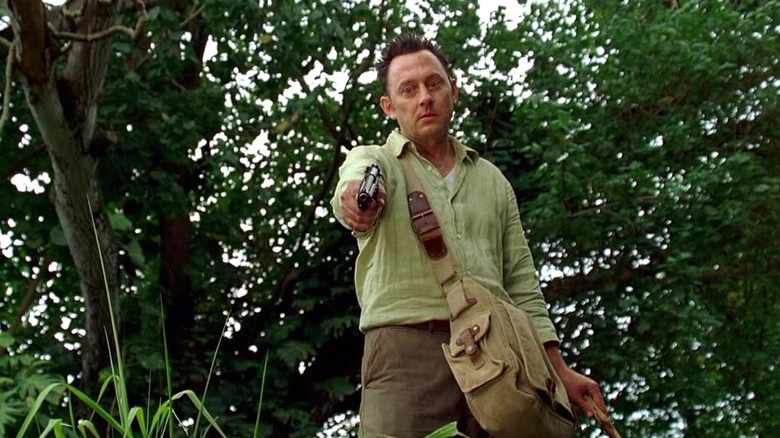
Ben Linus was shrouded in mystery up until "The Man Behind the Curtain" aired. Although Ben had hinted at his life outside of the Island, it was never clear what was true and what was part of his manipulations. However, "The Man Behind The Curtain" definitively revealed some important details about Ben's origins, making the shrewd leader a much more sympathetic character than he had been previously.
A flashback to 1971 reveals that a younger Ben (Sterling Beaumon) and his father first came to the island when they were employed by the DHARMA Initiative. It's a stressful time for Ben; his father still blames him for the death of Ben's mother, who died seven years earlier in childbirth. Haunted by memories of his mother, Ben attempts to join the group of "Hostiles" led by Richard Alpert (Nestor Carbonell).
Richard tells Ben that he must wait until he is older to join the group. Years later, Ben murders his father. Of all of Ben's crimes throughout the series, this one feels the most personal, and it goes a long way towards making Ben feel just as flawed and human as the rest of the "Lost" crew.
The End (Season 6, Episodes 17 And 18)
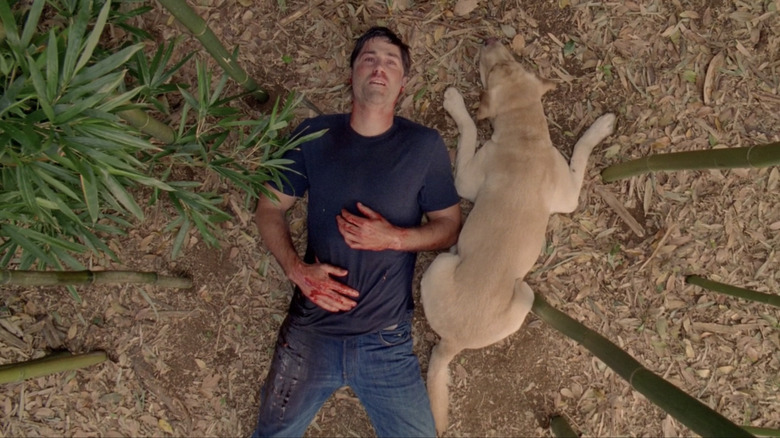
"Lost" had one of the most divisive season finales of all time. It's been years, and fans are still debating whether "The End" was a perfect sendoff for the characters or a massive disappointment. That kind of reaction is almost inevitable for a show with such a loyal fanbase, but "Lost" was still able to honor its central premise within its closing scenes. Fans who were expecting everything to be neatly wrapped up and explained were probably left disappointed. However, those who simply loved the characters were treated to a heartfelt celebration of the cast's great work on the series.
As romantic as "The End" becomes in its final moments, there's certainly no shortage of exciting set pieces. Jack's battle with the Man in Black is easily among the show's most brutal fights. It also sets up an intense sequence, during which Jack has to bring back the light at the center of the island.
If there is one unsung hero of "Lost," it is composer Michael Giacchino. Giacchino's powerful score has the ability to make even the most steel-hearted "Lost" viewer cry, and the tear-jerking final moments of "The End" represent Giacchino's finest work on the series. In the flash-sideways, Christian Shepard brings the entire cast together in a church. It's here that we see all of the couples on the series — Charlie and Claire, Jin and Sun, Desmond and Penny, Libby and Hurley, Rose and Bernard, Juliet and Sawyer, and Jack and Kate — reunite for a moment of joy.
Man Of Science, Man Of Faith (Season 2, Episode 1)
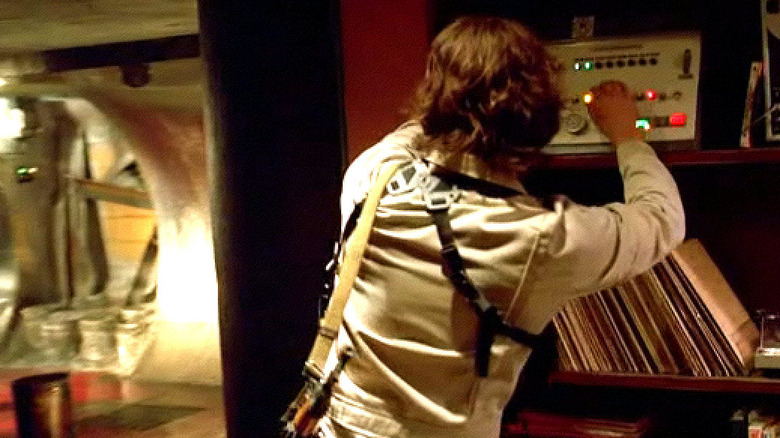
After its game-changing first season, "Lost" began to falter in season 2. Quite simply, the bunker was not as interesting as the mystery of the island itself. However, the second season got off to a promising start with its first episode, "Man of Science, Man of Faith." The debut of Henry Ian Cusick as Desmond Hume introduced one of the best characters in the entire series; in a poll conducted by The Washington Post, Desmond was ranked by "Lost" fans as their favorite character.
Desmond's backstory is brilliantly intertwined with the episode's flashbacks. In the opening scene, Desmond wakes up in a mysterious underground compound. It is clear that something is off; he's surrounded by technology that is several decades old. Desmond's daily routine is interrupted by the arrival of Jack and Locke, picking up from their discovery of the hatch at the end of the first season.
The flashbacks also give insight on the relationship between Jack and his father, Dr. Christian Shepard (John Terry). Seeing Jack once again reduced to his most vulnerable was very important. Jack is a natural leader and a skilled surgeon, and risked being too competent to be a truly relatable character. Jack's troubled history with his father fixed that. After an argument with his father, Jack relaxes by going out for a run; notably, on the track he has a heartfelt conversation with Desmond, years before they see each other again.
There's No Place Like Home (Season 4, Episodes 14, 15, And 16)
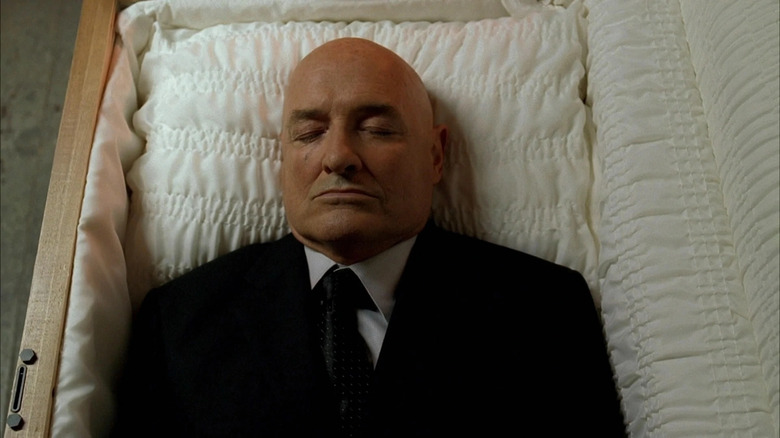
One of the reasons why the production of "Lost" became so challenging were the inadvertent effects of the 2007-2008 writer's strike and the influence of ABC, where the series aired. Showrunners Damon Lindelof and Carlton Cuse only intended to have "Lost" run for three seasons — balancing all of the show's storylines was already challenging enough — but ABC had a bona fide hit on its hands, and wanted more. With the extension of the narrative and the ongoing writer's strike, the fourth season was incredibly difficult to pull off. Between the death of Locke, the return of the Oceanic Six to Honolulu, the movement of the island itself, and an emotional confrontation between Jack and Sawyer, it took "Lost" three episodes to complete its season four finale, "There's No Place Like Home." Incredibly, the epic three-parter managed to tie together all of the intersecting timelines without introducing any obvious contradictions or plot holes.
"Lost" was never averse to large-scale action sequences, but "There's No Place Like Home" features set pieces worthy of the cinema. Sawyer's escape from the helicopter, Sayid's battle with Martin Keamy (Kevin Durand), and Ben's struggle to move the island made the jam-packed finale feel like a summer blockbuster. It's remarkable that, for all of its exciting high points, "There's No Place Like Home" managed to still land some emotional gut-punches. Jack and Ben's conversations at the funeral home helped remind viewers that, at its heart, "Lost" was first and foremost about its characters.
The Incident (Season 5, Episodes 17 And 18)
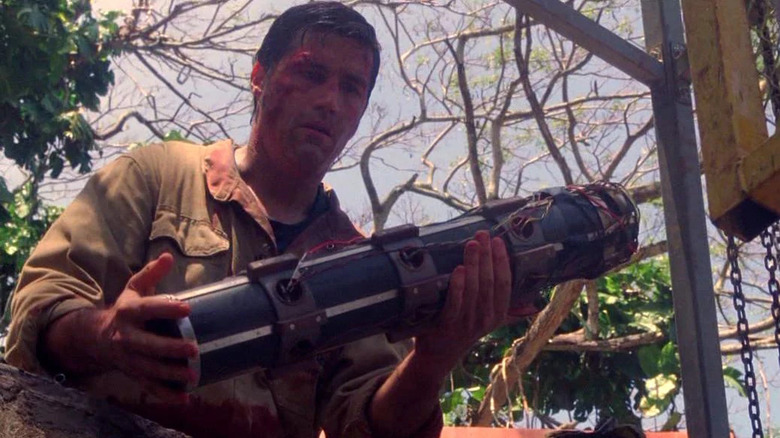
"Lost" truly became a hard science fiction series in its fifth season. The continuing story of the DHARMA Initiative allowed the show to lean into headier sci-fi concepts, and while this occasionally made "Lost" challenging to follow, the shortened length of the season ended up working in the show's favor. There was less time for bloated or filler episodes, and the storylines that were introduced felt purposeful. Even better, the two-part season five finale, "The Incident," finally revealed the identity of one of the most enigmatic characters in the "Lost" universe.
The backstory of Jacob (Mark Pellegrino), the Others' mysterious leader, is finally explained in the episode's opening flashbacks. Up until this point, the mythology surrounding Jacob had been shrouded in mystery, but in "The Incident" we learn that Jacob is the ageless protector of the island, and he's destined to battle his evil brother, the Man in Black. He has influenced events throughout the course of the series; "The Incident" also teased the larger role that Jacob would play in the final season.
Jacob is discovered within the remnants of the Taweret statue by John Locke (Terry O'Quinn), Ben Linus (Michael Emerson), and Sun-Hwa Kwon (Yunjin Kim). This is where "Lost" pulls off one of its greatest twists: It's revealed that the "Man in Black" has killed Locke and possessed his body. Locke uses his influence to convince Ben to attack Jacob, playing on Ben's vulnerabilities to get an advantage; Ben has never understood why he's unable to communicate with Jacob, and the resulting resentment makes him a willing accomplice in the Man in Black's shocking scheme.
Pilot (Season 1, Episodes 1 And 2)
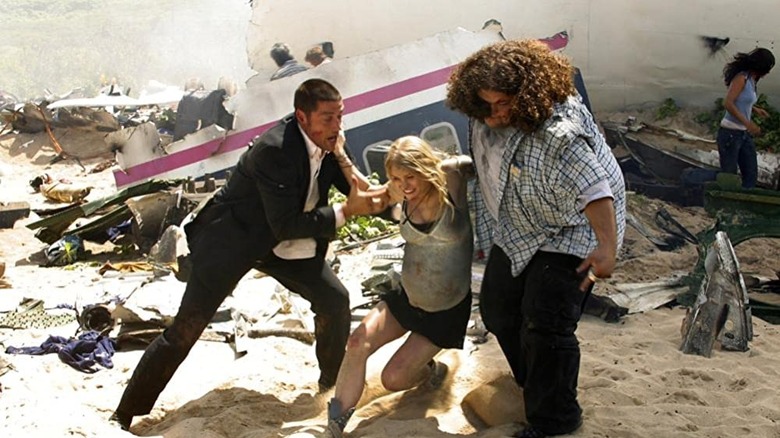
"Lost" would not have become the phenomenon that it was if it didn't hook viewers from the very beginning. For all of its faults, "Lost" still has one of the most impressive pilot episodes of all time. J.J. Abrams has become known for creating "mystery boxes" in his different media projects, and the "Lost" pilot sets up a ton of interesting questions for the series to answer. Why did the plane crash? How are the survivors connected? Where — and what — is the island?
Although "Lost" ultimately succeeded due to the strength of its ensemble, the pilot does a good job at making Jack the audience's avatar. Jack is a sympathetic character from the very beginning. He is a surgeon, and immediately starts organizing the crash survivors into a small colony. He also bonds quickly with Kate, even though he does not know about her violent past, and the duo have an exciting adventure as they search through the wreckage of the plane.
The pilot also tells us more about Charlie, Shannon, Boone, and Sawyer as they help Jack and Kate explore the island, and immediate tensions begin to emerge among members of the group, ramping up the tension right away. Although there is a lot of exposition, the "Lost" pilot does not skimp on action. At one point, the group is attacked by a monstrous polar bear; it's one of the scariest moments in the entire series, and immediately establishes the off-kilter tone of many of the show's mysteries.
Through The Looking Glass (Season 3, Episodes 22 And 23)
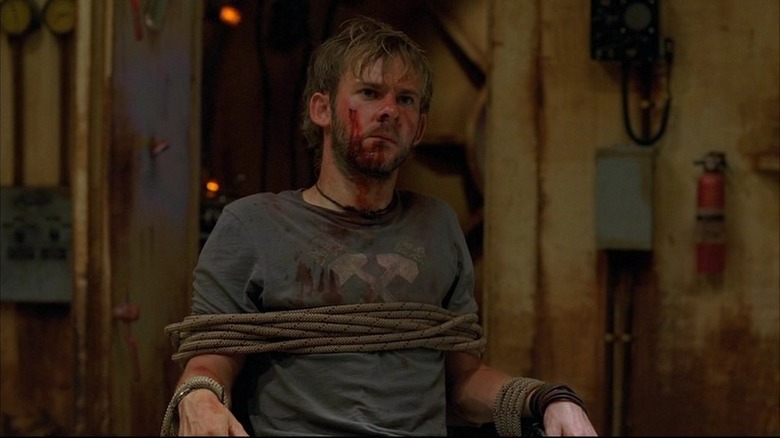
If you only watched "Lost" for the plot, then it's more than likely that it ultimately disappointed you. However, the reason that "Lost" became such a phenomenon was not because of the questions it asked, but because of its great characters. The viewers learned more about each of the survivors through flashbacks, and grew invested in their adventures together. That's what made the season 3 finale, "Through the Looking Glass," so tragic: It forced the audience to bid farewell to one of the show's most beloved characters.
Charlie Pace (Dominic Monaghan) has one of the most interesting character arcs on the series. Prior to the plane crash, he was a troubled musician in the rock band Drive Shaft. Charlie struggled with his sobriety, but on the island, he learned to be responsible. Charlie's protection of Claire Littleton (Emilie de Ravin) was heartwarming, and he becomes a paternal figure to Claire's son, Aaron.
This all pays off in "Through the Looking Glass," in which Charlie is captured by the Others when infiltrating the DHARMA Initiative's underwater research facility. In season 3, Desmond started receiving visions that foreshadowed Charlie's demise, making the musician contemplate his mortality. At the end of "Through the Looking Glass," Charlie sacrifices himself to save Desmond in an act of selflessness. However, before he dies, Charlie tells Desmond that they have been deceived, and that Desmond's girlfriend, Penny, did not send a boat to rescue them. He writes "Not Penny's Boat" on his hand before he drowns. It's arguably the most memorable single image from the series, and one that elicited with no small amount of tears from the audience.
Exodus (Season 1, Episode 23 And 25)
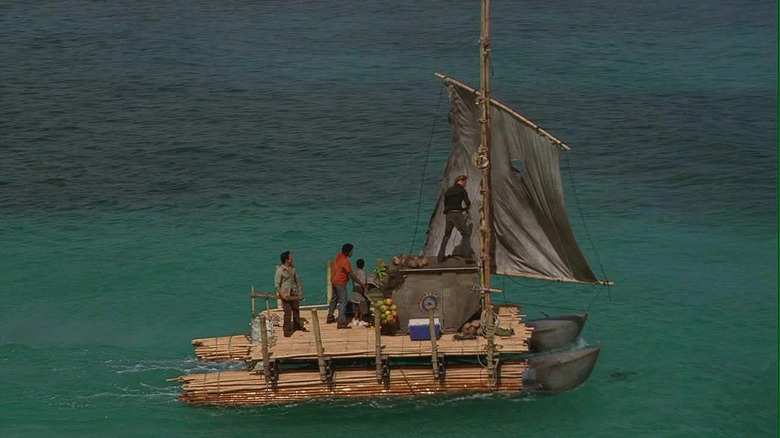
"Lost" made a habit of saving its best for last. All of the "Lost" season finales were mega-sized events that wrapped up seasonal arcs and introduced even more mysteries for the survivors to deal with. Just look at the first season's two-part finale, "Exodus." Under the steady direction of Jack Bender, "Exodus" did an excellent job of taking each character in an interesting new direction.
Like many episodes in the first season, "Exodus" begins with a flashback to the hours before the Oceanic Flight 815 took off. Before he boards the plane, Jack has a conversation with another passenger, Ana Lucia Cortez (Michelle Rodriguez). Ana would go on to become an integral character in the second season. Meanwhile, in the present, the survivors plan their most ambitious expedition yet. While Jack leads Locke, Kate, Hurley, and Dr. Leslie Arzt (Daniel Roebuck) to an abandoned ship, Sawyer, Jin (Daniel Dae Kim), Michael (Harold Perrineau), and Walt (Malcolm David Kelley) launch a raft and go in search of help.
These two separate adventures both conclude in exciting ways. The raft is attacked by another ship, and Walt is taken hostage. On the island, Jack and Locke discover a hatch that leads to a secret passageway. Their exploration of the hatch would become a major mystery in season 2.
The Constant (Season 4, Episode 5)
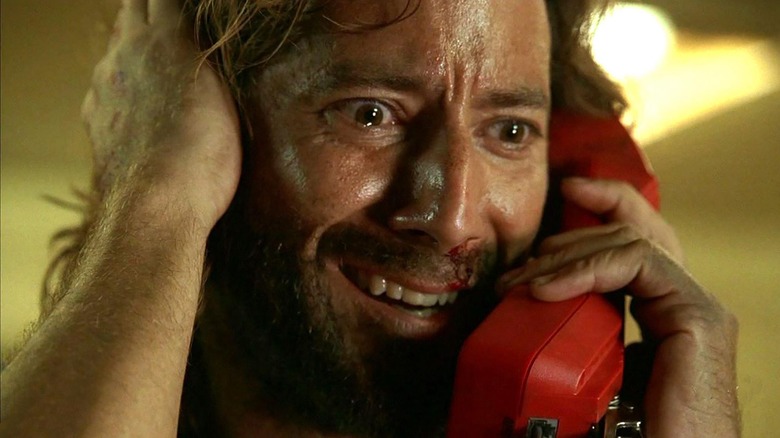
Time travel is an incredibly challenging narrative device to execute properly. Jumps in the timeline can easily become confusing, especially in a weekly television series that is already dealing with multiple ongoing storylines. However, one of the most unique things about "Lost" is how it used individual episodes to spotlight different characters. Not only did the season four episode "The Constant" gave the viewer more insight into the backstory of Desmond Hume, but that narrow focus helps keep its time travel plot manageable, leading to the show's very best episode.
In "The Constant," Desmond and Sayid Jarrah (Naveen Andrews) are flown by Frank Lapidus (Jeff Fahey) to a freighter outside of the island. During the flight, Desmond starts flashing back to 1996 and his time in the British Army. When Desmond's consciousness switches back to 2004, he is confused, and doesn't remember his life since 1996. Desmond's mind continues traveling back and forth between the two parallel timelines, eventually coalescing around his experiences working on a time machine at Oxford.
However, the emotional power of "The Constant" comes from seeing Desmond's relationship with his ex-girlfriend, Penny Widmore (Sonya Walger). Desmond knows that he and Penny are destined to be separated, but realizes that he can use her help in the present. Desmond's last phone call to Penny at the end of the episode is the emotional high point of the entire series.
Read this next: The 14 Best Sci-Fi Shows On Amazon Prime
The post The 21 Best Lost Episodes, Ranked appeared first on /Film.
0 Commentaires